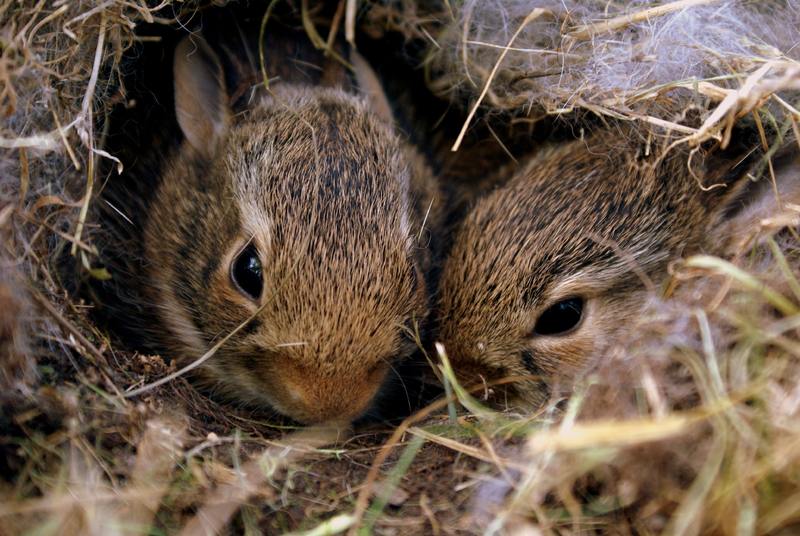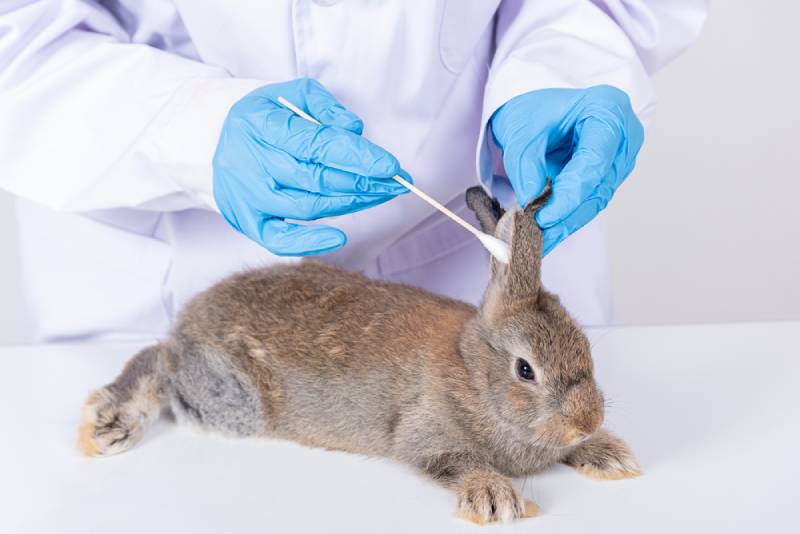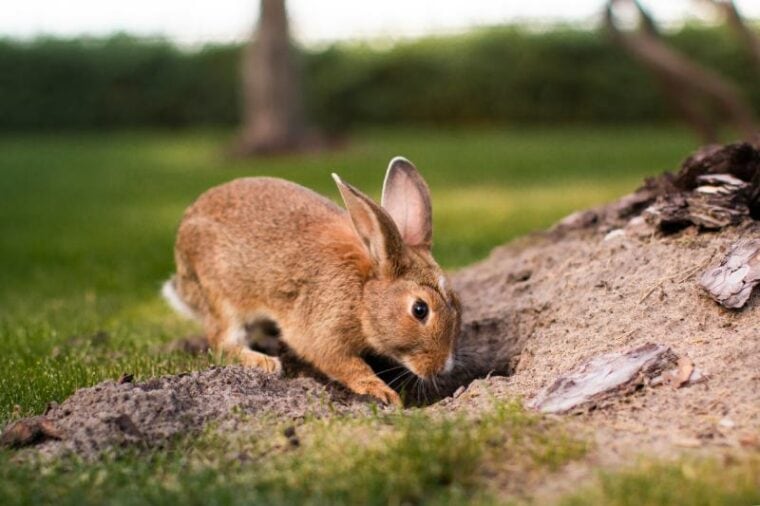
Rabbits are adorably fluffy and are loved by many pet owners. But like every other animal that people welcome into their homes, they are prone to a few habits that might seem strange, amusing, or destructive. Digging is one of the behaviors that pet rabbits exhibit that can cause mixed feelings when it comes to taking care of them.
Domestic rabbits dig because it’s an ingrained instinct left over from their wild ancestors. There’s more to the behavior than just a natural desire to get their paws dirty, though, so here are 10 reasons that your domestic bunny is digging up your garden or trying to burrow into your carpet.
The 10 Reasons That Rabbits Dig Holes
1. Attention Seeking
Most animal behaviors might be instinctive—even for domestic animals—but it can also be something that they learn through their interactions with you. Rabbits are naturally social animals; they don’t like to feel alone or neglected, so they’ll learn the best ways of getting your attention. Digging is a surefire way for them to do so. After all, few people will ignore the adorable bunny digging at the carpet. Whether you’re amused by the behavior or just want them to stop, giving them attention is sometimes all that they want from you.
The more they dig and the more attention you give them when they do, the more it reinforces the behavior. Gradually, they learn that digging is the best way to get your attention when they’re feeling lonely or neglected.
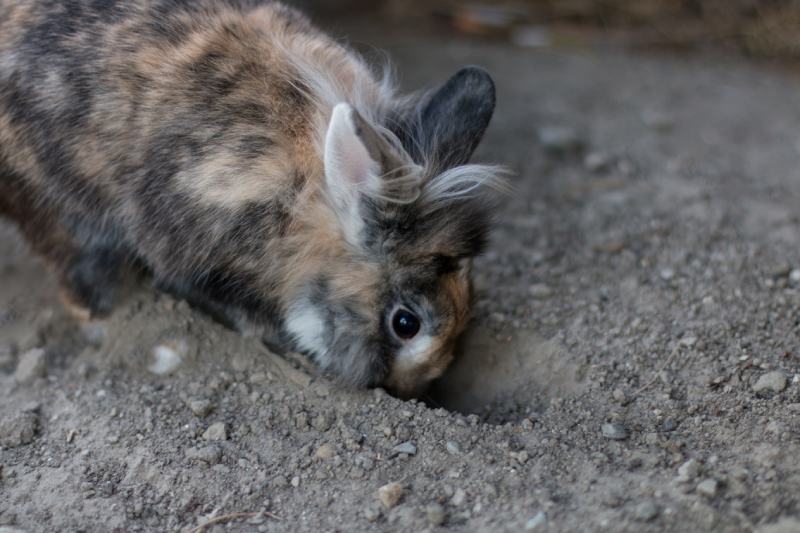
2. Boredom
Many of the reasons that wild rabbits dig aren’t the same for pet rabbits, but that doesn’t mean digging isn’t just as important. Some rabbits dig simply because they find it fun.1 They can dig up all sorts of strange and interesting things to chew on and keep their mind active.
This isn’t necessarily a problem if they dig in the right place and have other activities to distract them from digging when you don’t want them to. However, if your rabbit is feeling bored or neglected, they might take to digging just for something to do, which can quickly become a problem.
3. Instinct
Domestic rabbits are descended from wild European rabbits that dig holes to survive.2 This survival instinct continues even in their domestic descendants. Although it can be irritating for many rabbit owners, especially if they end up with holes in their garden or a torn-up carpet, digging is completely normal behavior.
Most domestic rabbits have no real need for digging holes, but that doesn’t mean they’ll ignore their instincts. If the ground is soft enough, they’re bound to put their paws to work. They might not dig warrens like their wild cousins, but they’ll take advantage of the soft earth, even if you’d prefer that they don’t dig holes at all.
4. Food
Wild rabbits often forage for their food, especially if there isn’t much grass, clover, or other plants for them to eat.3 They’ll sometimes eat twigs and bark and dig in loose earth to uncover food.
Domestic rabbits will sometimes dig for food too, especially if they’re feeling hungry when outside. This inclination will help you encourage your rabbit to dig only where you want them to. Create a digging spot with a deep litter tray, and bury their favorite food in loose earth or another material that your rabbit adores. This will encourage them to dig out their treats and keep their brain active.
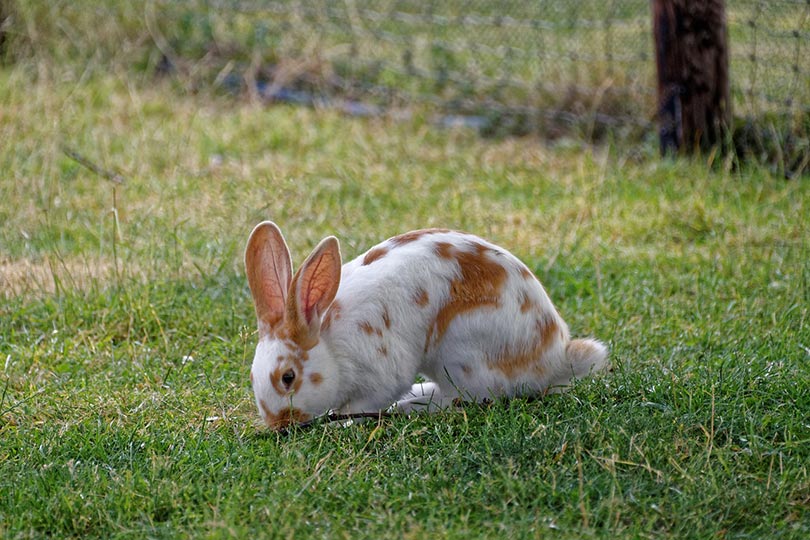
5. Hiding From Predators
One reason that wild rabbits dig so many holes is to hide from predators. Rabbits are prey animals, and there are plenty of predators that won’t pass up the chance to snatch up a bunny for a meal. For this reason, rabbits need a safe place to hide.
Digging burrows and warrens is how they survive and why it’s such an instinctive behavior for all bunnies, not just the wild ones. Domestic rabbits might be in safer situations when it comes to predators, but digging holes so they can hide when they’re scared is still instinctive for them.
Some rabbits will also dig holes to escape. If they get spooked for some reason, a tunnel underground is the perfect way to get away without being found. This can be a big problem if your outdoor bunny digs underneath their enclosure fence.
6. Nail Maintenance
Like humans, rabbits have nails that need to be maintained. While we can cut our own with little trouble, it can be challenging to safely trim your rabbit’s claws due to their natural flightiness. Even less-timid rabbits can squirm when you try to cut their claws, and it can lead to a few bloody nails if you accidentally catch the quick.
A wild rabbit’s nails are naturally worn down by rocks and other hard surfaces, as well as their habit of digging burrows. Domestic bunnies have less access to this variety of surfaces, so tending to their nails can be more of a challenge. Giving them plenty of opportunities to dig can help, especially in a special earth-filled digging box or their outdoor enclosure. Digging is a natural way for them to keep their claws in good condition.
7. Nest Building
Female rabbits are well-known for their digging habits, especially in the wild. They’ll burrow into the ground to create a safe nest when they’re about to give birth. To do this, they’ll gather straw and use their own fur to make a warm space that keeps their young in one place and well away from predators.
If your female rabbit is pregnant, you’ll likely find her digging a hole and filling it with soft materials, just like her wild ancestors. It’s her way of caring for their litter and keeping her and her babies safe.
8. Privacy
Sometimes, the world outside is too much, and your rabbit just wants a place to hide away from it all and take time for themselves. A burrow is a secure and sturdy shelter that offers them privacy from prying eyes.
While a wild rabbit’s desire for privacy is typically solely survival based, your domestic bunny might be feeling overwhelmed by their surroundings. Maybe your children are being too noisy, or there are too many new smells around your bunny’s room and they just need a break.
Help them out by giving them a spot to dig or a blanket to burrow into. An overturned cardboard box or a tunnel can settle their desire for privacy too.
9. Shelter From the Weather
The heat can be just as dangerous for rabbits as it is for us. With their fur coats, they need an effective way to stay cool on hot days. We might hate the idea of digging a hole in the middle of summer, but your rabbit will dig to have a cool patch to enjoy when everywhere else is just too warm.
Lower levels of the earth are naturally cool, and as your rabbit digs, they shift all the loose hot dirt around until they’ve created the perfect cool spot to take a nap in.
10. Desire to Be Petted
Some rabbits don’t like to be petted or held, but others adore all the attention that you can give them. They’ll demand that you pet them by nudging your hand or your leg or even digging into your lap.
Even if they’re on the other side of the room, if they want to be petted, they’ll dig at the carpet or into the blanket that you left out for them. As long as it helps them convince you to pet them, they’ll happily dig everywhere they can get to.
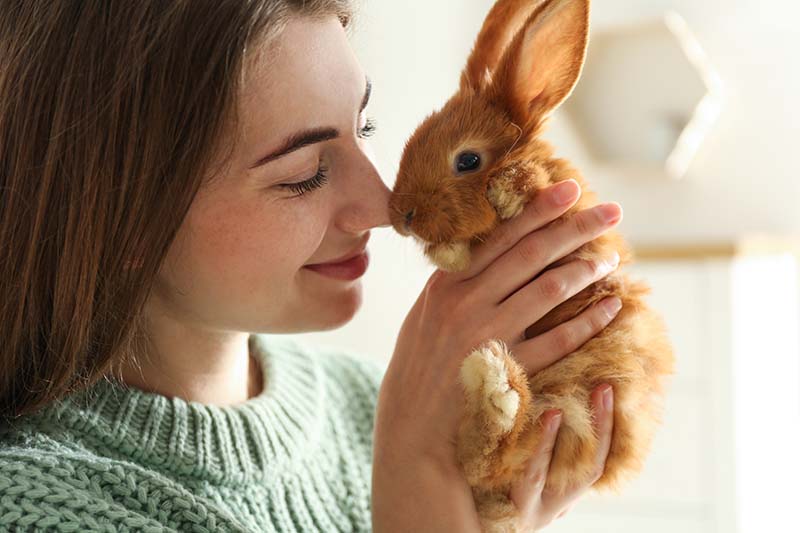
Should You Let Your Rabbit Dig?
Digging might be a common behavior for rabbits and even has a few health benefits for them, but it can be destructive. Unfortunately, not all rabbits will dig where you want them to, and if you don’t direct their attention to safe spaces, it can lead to damaged furniture or an escape artist.
Give your rabbit time to explore outside of their cage, though you should supervise them. If your rabbit hangs out outside, ensure that they can’t escape their pen when they dig by burying the fence at the edges of the enclosure. This will create a barrier that prevents your rabbit from digging their way to freedom.
Indoors, never leave your rabbit unattended when they’re out of their cage. This will keep them out of trouble and stop their digging habit from damaging blankets or your furniture. If you encourage your rabbit to dig in the right places, though, there’s no reason that the behavior should be concerning or destructive.
How to Make a Safe Digging Spot for Your Rabbit
Keeping your rabbit safe is crucial, and providing them with suitable spaces to dig is the best way to ensure that they benefit from the behavior without putting themselves in danger. To do this, you’ll need to make a safe spot for them to dig.
Making a digging spot is easy. All you need is a cardboard box, a litter tray with high sides, or if you have the space, a child’s plastic paddling pool. Fill it with loose dirt or sand. You can also experiment with different rabbit-safe materials to see which one entices them to dig in. To encourage your rabbit, try burying a few of their favorite treats for them to find.
If your rabbit is determined to dig in the wrong area, get their attention by clapping or stomping. Don’t do this too loudly or too close to your rabbit, though. The intention isn’t to scare them, but rather to focus on you.
Once you have their attention, redirect them to their digging box so they can dig there instead. Make sure to be consistent about where you want your rabbit to dig, and praise them when they get it right.
Summary
Digging is normal behavior for rabbits, even domestic ones. Unlike their wild ancestors and cousins, domestic rabbits don’t need to dig burrows to survive, but this doesn’t stop them from partaking in their instinctual behavior. Your pet rabbit might be a particularly avid digger.
Your rabbit may dig in their enclosure in the garden, burrow into blankets indoors, or scratch the carpet. They do this to maintain their nails, seek attention, find a cool spot to nap, or simply because they find it fun.
Featured Image Credit: Alexandr Opalat, Shutterstock


